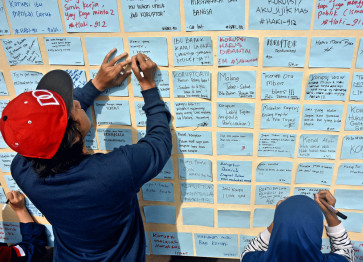Popular Reads
Top Results
Can't find what you're looking for?
View all search resultsPopular Reads
Top Results
Can't find what you're looking for?
View all search resultsYoung faces of graft: Better prevention campaigns needed
Many anticorruption campaigns carelessly sell pop culture and encourage influencers to reach the attention of young people, while their messages or packaging may be considered unappealing or irrelevant.
Change text size
Gift Premium Articles
to Anyone
T
he youth, many assume, are far less prone to corruption. Yet data of the Corruption Eradication Commission (KPK) show that, as of 2018, 75 people being processed by the commission were 20 to 40 years of age.
Those implicated include young regional heads, legislators, civil servants and young entrepreneurs. A recent case saw former youth and sports minister Imam Nahrawi named suspect for accepting bribes of Rp 26.5 billion (US$1.9 million) from the National Sports Committee (KONI), among others, and earlier Jambi Governor Zumi Zola — a former actor who was barely 36 years old when installed as governor in 2016 — named a suspect charged with bribing local councilors in a bid to have the 2018 provincial budget approved without hassle.
In addition, a House of Representatives lawmaker and member of the House budget commission, Wa Ode Nurhayati, was found guilty of accepting a Rp 6.25 billion bribe for infrastructure projects in Aceh and Minahasa, North Sulawesi. Wa Ode, born in 1981, is one of 82 millennials prosecuted in a corruption court in the past 10 years.
Others include the former chairperson of the Indonesian Youth National Committee (KNPI), Fahd el Fouz, the son of former lawmaker Zulkarnaen Djabbar, Dendy Prasetia Zulkarnaen Putra, and businessman and former House member Muhammad Nazaruddin.
In Malaysia, two graft suspects include young billionaire Low Taek Jho aka Jho Low, who was allegedly involved in the $4.5 billion Malaysia Development Berhad corruption case. Recently, Pakistan’s anticorruption body arrested opposition leader Maryam Nawaz, daughter of former prime minister Nawaz Sharif, in relation to a case connected to the family's Chaudhry Sugar Mills.
These cases confirm the need for research, especially amid the permissiveness of corruption among young people. The 2017 Global Corruption Barometer survey released by Transparency International shows that nearly 70 percent of young respondents across the Asia-Pacific region claimed to have paid bribes in the past 12 months, of which 34 percent were for public services, such as the issuance of ID cards or driver’s licenses or to obtain services from the Health Care and Social Security Agency.
Not unlike elders, the young seem permissive to small-scale corruption, such as plagiarism, gratuities to lecturers, bribing police for a driver’s license or bribing government employees for processing ID cards. Young people think corruption is worth combating only when it involves a large sum.


















